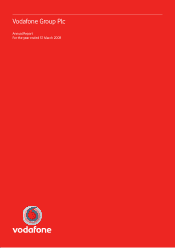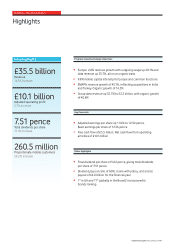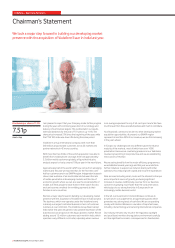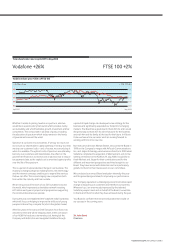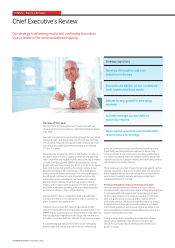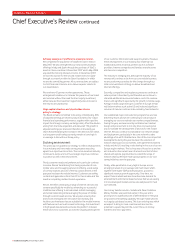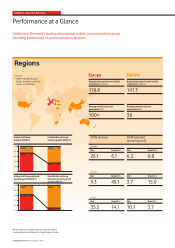Vodafone 2008 Annual Report Download - page 8
Download and view the complete annual report
Please find page 8 of the 2008 Vodafone annual report below. You can navigate through the pages in the report by either clicking on the pages listed below, or by using the keyword search tool below to find specific information within the annual report.
Chief Executive’s Review continued
Actively manage our portfolio to maximise returns
We completed the acquisition of Vodafone Essar in India in
May 2007. We also strengthened our total communications
offerings in Italy and Spain through the purchase of Tele2’s
assets in those countries in December 2007 and in May 2008
acquired the minority interests in Arcor. In December 2007,
we won the auction for the second mobile licence in Qatar
through a consortium with the Qatar Foundation, in which
we are the controlling partner. All our transactions are subject
to strict financial criteria so as to deliver superior returns to
our shareholders.
We now have 42 partner market agreements. These
arrangements enable us to increase the presence of our brand
and services without the need for direct equity investment,
either because the investment opportunity does not exist or
the returns are unattractive.
Align capital structure and shareholder returns
policy to strategy
The Board remains committed to its policy of distributing 60%
of adjusted earnings per share by way of dividend. Our robust
financial and operating performance, together with a positive
impact from foreign currency exchange rates, offset the dilution
arising from the India acquisition and delivered 11% growth in
adjusted earnings per share and therefore in dividends per
share. Notwithstanding the increase in net debt to £25.1 billion,
our long term credit ratings currently remain at low single A
on average, in line with our Group policy.
Evolving environment
Two years ago we updated our strategy to reflect developments
in our industry and have made strong progress executing
against our objectives since then. The communications industry
continues to evolve and our five strategic objectives continue
to position us well in this environment.
Firstly, customer needs and preferences in particular continue
to evolve. We are transitioning from being a provider of core
mobile voice and messaging services to offering a wide range
of communications and one of the key advancements in the
past year has been the mobile internet. Customers are taking
content and applications from their PC to their mobile and this
needs a compelling mobile internet experience.
We are, therefore, developing a range of internet services and
content specifically for mobile by enhancing our successful
Vodafone live! offering to include email, instant messaging
and social networking while leveraging the power of mobile
through location based services. We are also ensuring that
devices are developed with innovative functionality and
intuitive user interfaces that are suitable for the mobile internet,
with features such as touch screen technology. Our investment
in high speed data networks provides the platform to deliver
these services to customers, as does the ongoing development
of our customer information and support systems. However,
these developments in our industry also challenge our
traditional business model as partners such as software
providers, internet companies and handset manufacturers
also become competitors.
The industry is changing and, although the majority of our
revenue will continue to be from our core mobile business,
we are positioning ourselves for this change through our
total communications strategy to deliver broadband and
internet offerings.
Secondly, competitive and regulatory pressures continue to
reduce prices in the industry and therefore we continue to
stimulate additional revenue and reduce costs. On revenue,
there is still significant opportunity for growth in mobile usage.
Average mobile usage levels per customer in Europe remain
well below markets such as the US and India and significant
volumes of minutes continue to be carried by fixed networks.
Our established major cost reduction programmes are now
delivering results and we are continuing to look at ways of
managing our costs to maintain our market competitiveness.
During the year, we have recently centralised our handset
design and procurement to not only drive cost savings but
also to facilitate the development of devices for the mobile
internet. We also continue to standardise our network design
and deployment, particularly in the core network to take
advantage of an all IP infrastructure. One of the more important
developments during the year has been the extension of
network sharing across our markets, with agreements reached
in Italy and the UK, resulting in site sharing in nine out of our ten
Europe region markets. This is a key area of focus for us and we
aim to build on the current level of around one third of sites
shared and explore opportunities to extend the scope of
network sharing. We have made good progress on our cost
saving initiatives over the past year.
Finally, while penetration is very high in Europe, across
emerging markets it is on average still much lower which,
together with higher GDP growth prospects, provides a
significant revenue growth opportunity. Over time, we
expect these markets will also show the same demand for
entertainment and internet based services that we are seeing
in more developed markets and we are well placed to meet
such demand.
Our money transfer solution, Vodafone M-Pesa/Vodafone
Money Transfer, was launched earlier in the year and is
proving to be a significant point of differentiation in Kenya as
we provide some banking capability through mobile phones
to a largely cash based country. This is an evolving area which
we expect to bring to more countries and also has the
potential to expand beyond the current focus on money
transfers and micro payments.
6 Vodafone Group Plc Annual Report 2008
Vodafone – Executive Summary

